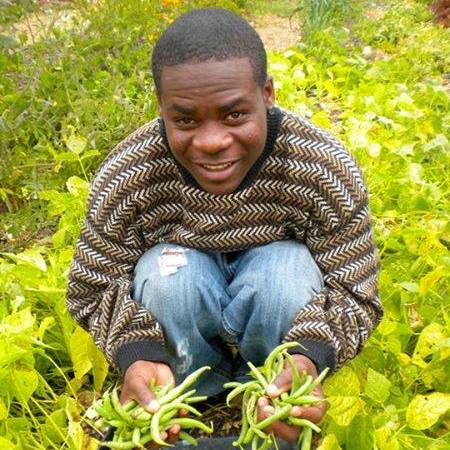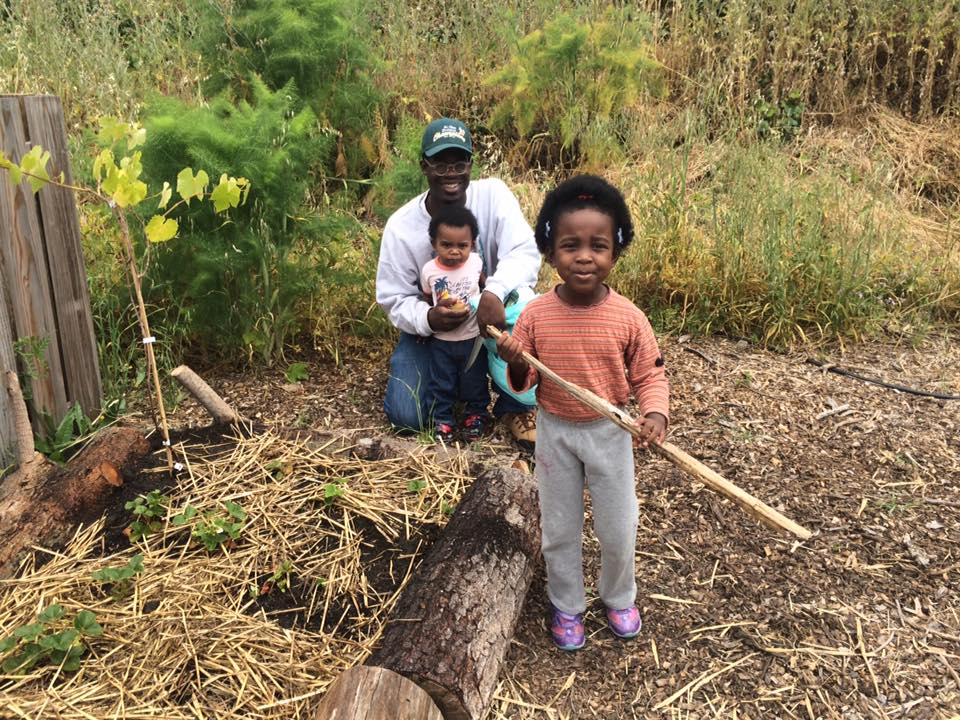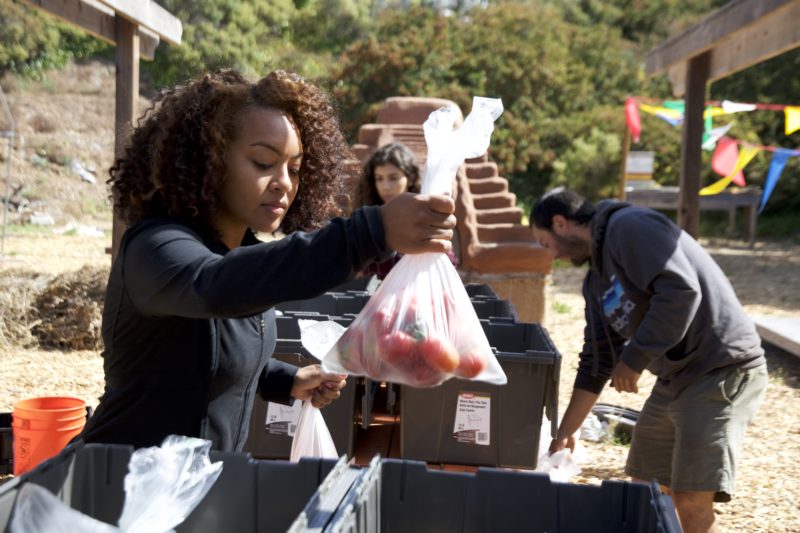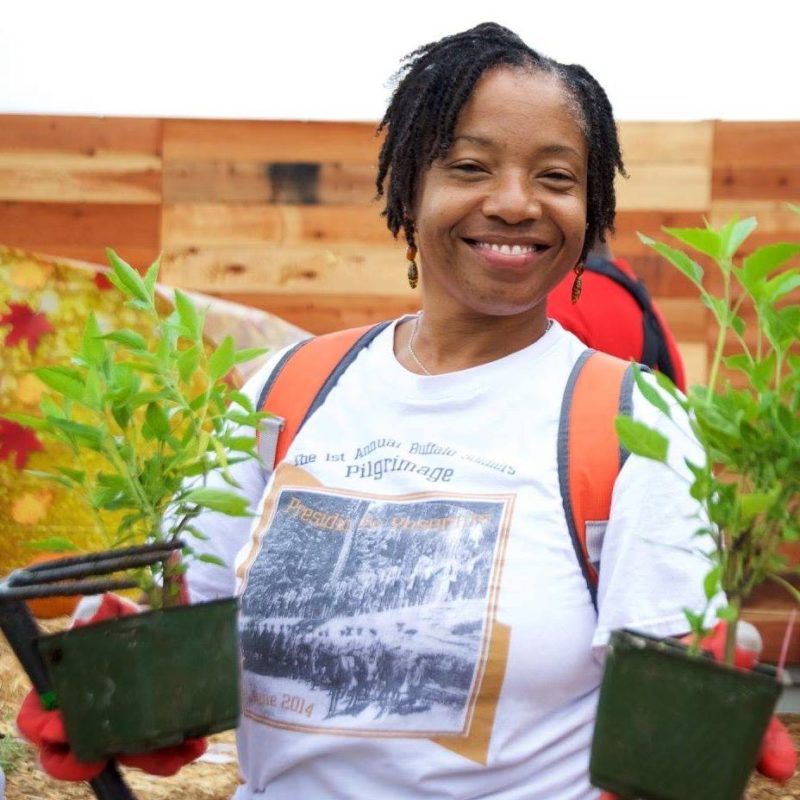Organizing in the Garden: Creating Power in Richmond, California
How can a community respond to a century of domination and oppression by corporate interests? That is precisely the question that Urban Tilth and residents of Richmond, California, are trying to answer. Located in west Contra Costa County, just north of San Francisco, Urban Tilth helps the “community grow its own food, while also teaching local residents about the relationships among food, health, poverty, and justice.”
The Chevron Richmond Refinery occupies nearly 3,000 acres in Richmond. The oil company has dominated local politics and polluted the community since the facility opened in 1902. In 2012, the health of Richmond residents was further compromised when a massive refinery fire erupted, which caused thousands of hospitalizations. In response, local organizations, such as Urban Tilth, have been working to build power so that residents can improve their health, protect the environment, and develop their own autonomy.
“How much control do we have over our health and neighborhoods if we cannot control our food?”
Doria Robinson, the executive director of Urban Tilth, shared that residents of west Contra Costa County suffer from high rates of heart disease, obesity, and diabetes. The community also has challenges with access to food, as an estimated 53.4 percent of Contra Costa adults reported being food insecure in 2011‒2012. Richmond only has one full-service grocery store, and in a recent survey completed by Contra Costa Health Services, 43.6 percent of adults said that they do not always have access to affordable fresh produce. These health disparities concerned the founders of Urban Tilth. Community members cannot fight for their rights and justice if they are unable to function due to health issues.
An estimated 53.4 percent of Contra Costa adults reported being food insecure in 2011–2012.
Urban Tilth’s mission is to cultivate agriculture in west Contra Costa County to help the community build a more sustainable, healthy, and just food system. The organization started a community-supported agriculture (CSA) program in 2016 called Farm to Table CSA to respond to the community’s need for healthy produce and food sovereignty. Every week, around 150 CSA members receive a box of fresh, locally grown seasonal fruits and vegetables such as peppers, lettuce, carrots, and oranges. The program is subsidized by some members who pay an additional $5 donation with their $20 per week membership fee to make the $10 low-income boxes possible. Urban Tilth also accepts EBT cards, which supply food benefits through the federal government’s Supplemental Nutrition Assistance Program (SNAP).
 Each week, the organization provides free produce at a farm stand in North Richmond, one of the lowest income areas in the city where the organization’s newest urban farm is located. All of the produce is pesticide-, herbicide-, and chemical fertilizer-free, and is grown by community members. Many of Urban Tilth’s CSA members have shared that their grocery bills have decreased significantly because they are trying to eat all of the produce in their weekly boxes. Farm to Table CSA members say that the weekly box allows them to eat significantly more fruits and vegetables than ever before, and they are feeling healthier. Currently, the Farm to Table CSA is the only source of Contra Costa County-grown produce besides the remote farm stands in the eastern part of the county.
Each week, the organization provides free produce at a farm stand in North Richmond, one of the lowest income areas in the city where the organization’s newest urban farm is located. All of the produce is pesticide-, herbicide-, and chemical fertilizer-free, and is grown by community members. Many of Urban Tilth’s CSA members have shared that their grocery bills have decreased significantly because they are trying to eat all of the produce in their weekly boxes. Farm to Table CSA members say that the weekly box allows them to eat significantly more fruits and vegetables than ever before, and they are feeling healthier. Currently, the Farm to Table CSA is the only source of Contra Costa County-grown produce besides the remote farm stands in the eastern part of the county.
Urban Tilth has cultivated a network of 6,000 people who regularly engage through educational programming, events, and the CSA program. The organization has also trained over 400 youth in its intensive Summer Apprentice Program. This program introduces youth to agricultural production, as well as social, economic, and climate justice. Urban Tilth frequently collaborates with partners and hosts educational agricultural events, but most recently it has been rethinking the role of gardens. Gardens are not just a place to grow plants, hang out, and relax—they can also be places to organize around community issues.
Urban Tilth has invited partners, such as Communities for a Better Environment (CBE), Asian Pacific Environmental Network (APEN), the US Food Sovereignty Alliance, and Climate Justice Alliance (CJA), to its gardens to collaborate on workshops covering issues such as Climate Change 101, immigration justice, and political power mapping. Urban Tilth also focuses on education in local schools and school gardens. These efforts help introduce kids to their own power to impact their communities, local governments, families, neighborhoods, and diets. Through its model of growing, cultivating, and sustaining community gardens, Urban Tilth helps create a healthy, just economy where people can be employed in the act of feeding their community. Urban Tilth works to restore land and increase access to healthy food, while creating jobs and empowering local residents to demand justice.
Gardens can be places to organize around community issues.
Access to food is a human right, and Urban Tilth utilizes public land to create a sustainable economy around urban farms, school, and community gardens. When planning for gardening space, the organization aims to reclaim vacant spaces in the city that the local government could not afford to develop. Urban Tilth works to repurpose formerly vacant lots to create productive spaces where residents can start to imagine a future for Richmond. It currently manages seven community gardens and two farms that are all on public land. Additionally, Urban Tilth has been working to create a cooperative grocery store and a local farmer distribution cooperative that can bring locally grown produce to the new co-op and possibly other abundant corner stores. Urban Tilth hopes to transform the food deserts into areas where locally grown, healthy food is available on every block for a price everyone can afford.
Access to food is a human right, and Urban Tilth utilizes public land to create a sustainable economy around community gardens.
Throughout the past 14 years, Urban Tilth has supported the development and growth of Unity Park on the Richmond Greenway. A converted area of the old Santa Fe rail line, the Greenway was the site of Urban Tilth’s first community garden, Berryland. It is an open gleaning berry garden that boasts many varieties. Berryland and the Greenway Community Gardens are gardens without fences and are open to the public 24 hours a day. Once Berryland was established, it was picked clean of berries by the kids and families using the new Greenway to ride bikes or walk to and from school. Berryland is now in a larger and more efficient location with dozens of strawberry, raspberry, blueberry, and other berry plants.
Urban Tilth and other Richmond nonprofit organizations “envision the Greenway as a safe, vibrant public space where people from the entire community and beyond come together to restore, cultivate, and protect the natural environment and create and enjoy cultural and recreational activities. The Richmond Greenway is a vehicle for economic, community, and cultural development.” Sometimes residents do not feel safe gathering outside, and they often choose to stay indoors instead. This new Richmond green space gives neighbors an opportunity to talk and learn about each other. The Richmond Greenway initiative created an opportunity for growth and bonding with the community. Involvement with the Greenway expanded Urban Tilth’s focus and created an additional emphasis on community engagement.
Doria shared that in the future, she envisions that Urban Tilth will help to create space so other people in the community and beyond can have their voices heard and become stronger together. She wants to ensure that community members are developing as leaders with the skills and knowledge needed to help build the new economy. Urban Tilth believes that the community must be willing to move forward with its own power to grow what community members need to thrive.



